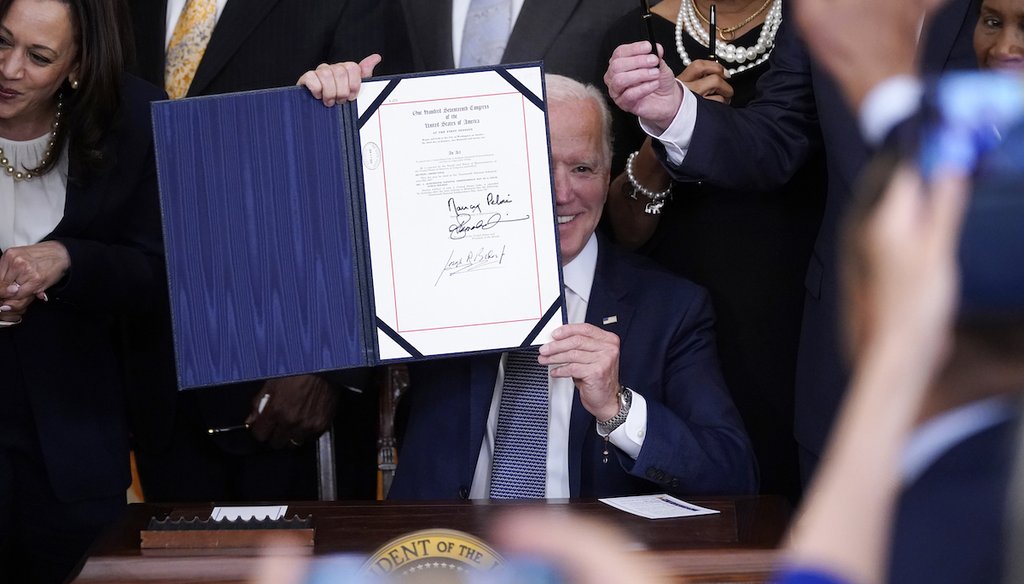Stand up for the facts!
Our only agenda is to publish the truth so you can be an informed participant in democracy.
We need your help.
I would like to contribute

President Joe Biden holds the Juneteenth National Independence Day Act after signing it in the East Room of the White House. (AP Photo/Evan Vucci)
If Your Time is short
-
June 19 marks the day in 1865 that Union troops landed in Galveston, Texas, and announced the end of slavery.
-
Juneteenth gained prominence through the Civil Rights movement and the call for economic and social justice.
At a time when Republican-led states are moving to restrict how teachers can talk about the legacy of slavery and racism in their classrooms, Republicans in Congress just rallied in overwhelming numbers to mark the end of slavery in the South.
This week, the Senate unanimously approved June 19, or Juneteenth, as a new federal holiday. The next day, by a vote of 415 to 14, the House followed suit. President Joe Biden signed it June 17 on his return from Europe.
"Great nations don't ignore their most painful moments," Biden said at the signing ceremony. "We come to terms with mistakes we made. And remembering those moments, we begin to heal and grow stronger."
June 19 marks the day in 1865 that Union troops landed in Galveston, Texas, and announced the end of slavery. It has been celebrated as a victorious turning point in the emancipation of African Americans for over 150 years. A sense of triumph infused the words of Republicans and Democrats as the bill that put Juneteenth on par with the Fourth of July steamed toward passage.
"What I see here today is a racial divide crumbling, being crushed this day, under a momentous vote that brings together people who understand the value of freedom," said Rep. Sheila Jackson Lee, D-Texas, June 16.
"America's failure to rightly recognize our painful and often unjust history have meant ongoing division, open wounds that continue to fester," said Rep. Warren Davidson, R-Ohio, June 16 on the House floor. "Today, let us not fail to persuade our colleagues. Let us recognize this holiday."
A distinct minority of Republicans — 14 in the House — did not rejoice. Rep. Matt Rosendale, R-Mont., was among those voting "no."
"This is an effort by the Left to create a day out of whole cloth to celebrate identity politics as part of its larger efforts to make Critical Race Theory the reigning ideology of our country," Rosendale said in a statement. (That is based on distorted facts on critical race theory.)
With June 19 coming on a Saturday this year, federal workers will get Friday off. States are free to make their own calls, and most state workers don’t get the holiday. Maine, Oregon and Illinois are the most recent states to declare Juneteenth as an official holiday, but it won’t take effect for a year. While 47 states recognize the day, in total, only nine states, plus the District of Columbia, have added it to the official state holiday calendar. (The others are New Jersey, New York, Texas, Virginia, Connecticut and Massachusetts.)
Private employers make their own rules. Companies such as Lyft, US Bank,Target and Google have made June 19 a paid holiday, as has the National Football League.
Juneteenth has a long history, and it has come to represent something more illustrative about the complex experience of being Black in the United States.
Especially since the Civil Rights movement, the message of Juneteenth has shifted from being a day to celebrate freedom to one that calls people to reflect on the nation’s long history of racial inequality.
President Abraham Lincoln signed the Emancipation Proclamation in 1863, but it wasn’t until two and half years later that it became a reality in Texas, the last bastion of the Confederacy. On June 19, 1865, Union Gen. Gordon Granger landed in Galveston, Texas. Granger’s men marched through the city reading General Order No. 3 at municipal buildings and churches, declaring that all slaves were now free.
By some estimates, there were still 250,000 people enslaved in Texas at that point.
Laura Smalley was 10 years old, enslaved on a Belville plantation, about 120 miles from Galveston on June 19, 1865. In a recorded interview 76 years later, she recalled how the Confederacy’s defeat had not ended slavery for her and her mother. Even after the plantation owner returned from war, Smalley said, he mentioned not a word of freedom while those he enslaved continued unaware.
"Old master didn’t tell everyone we was free," Smalley said. "He didn’t tell. I think now, he waited six months. ... Six months. And turned us loose on the 19th of June. That’s why you know we celebrate that day, colored folks."
Leaders in Galveston’s Black community launched a tradition of public celebrations of June 19, although newspaper stories at the time didn’t refer to it as Juneteenth. That emerged decades later, said Galveston Historical Foundation head Dwayne Jones.
The day enjoyed popularity mainly in Texas and Oklahoma. Other places marked emancipation on different days. African Americans in Tennessee focused on Aug. 8 in line with stories that President Andrew Johnson freed his slaves in Greenville, Tenn., on that day in 1863. Washington, D.C., observed April 16, the day in 1862 when Congress abolished slavery in the the District of Columbia. For the people of Thomaston, Ga., it was May 29, for reasons similar to those in Galveston.
As America moved into the new century, some Black leaders argued that celebrating freedom was not enough.
Black Americans, a 1913 editorial in the AME Church Review said, "had been wandering for these past forty years in the wilderness of political serfdom and drinking the bitter water ... of Jim Crowism. Within the next fifty years there must come to the Negro a new emancipation ... from social degradation, industrial and commercial exclusion, political inequality and all discrimination based on race and color."
The Jim Crow practices in the South fell heavily on the public display of solidarity. Accessing public spaces for celebration was difficult.
To pick just one example, in 1930, under pressure from whites, the sheriff in Warrenton, Ga., told Black organizers to "call it off," said historian Mitch Kachun, author of "First Martyr of Liberty: Crispus Attucks in American Memory."
Kachun traced the growing awareness of June 19 to the migration of Black people out of the South. By 1920, over 17,000 Black Texans moved away to states from Massachusetts to California. During World War II, thousands more relocated further west to find work in defense industries.
"As Black Texans set down new roots in other regions, they carried along both their struggles for economic and social justice and their Juneteenth traditions," Kachun wrote.
The social justice overtones of Juneteenth became more prominent through the 1950s and 1960s. If any event fused Juneteenth with the Civil Rights movement, it was the 1968 Poor People’s March on Washington.
In Oklahoma folklore, a black Union soldier traveled by mule to share word of emancipation outward from Texas. The Poor People’s March started hundreds of miles from Washington a few weeks after the assassination of Rev. Martin Luther King, Jr.
"Marchers borrowed the widely recognized Juneteenth image of a mule-drawn wagon to deliver their message throughout the South," wrote Colgate University historian Graham Hodges. "Led by a mule, Ralph Abernathy, one of Dr. King's closest assistants conducted the march, stopping at the Lorraine Hotel, where King was gunned down."
The march ended with a ceremony attended by about 50,000 at the Lincoln Memorial on June 19.
Juneteenth.com, one of several efforts to promote recognition of the day, tracked large events in Milwaukee and Minneapolis back to the 1968 march.
In 1980, the Texas Legislature made it a state holiday.
Juneteenth as a widespread celebration was far from inevitable. The people in Texas might have been among the last to be freed, but that turning point was just as powerful in other states, and came at different times.
Some states recognized other dates. The U.S. already officially marks emancipation, although it is not widely commemorated. Years of effort by Black businessman Richard Wright led Congress to designate Feb. 1 as National Freedom Day in 1948. That was the day in 1865 that Lincoln signed the resolution that produced the 13th Amendment banning slavery.
But observance of National Freedom Day foundered. Groundhog Day, which is observed a day later on Feb. 2, tends to get more ink.
Many commentators trace the rising prominence of Juneteenth to how late the news of freedom arrived in Galveston.
"It is the observance of a victory delayed, of foot-dragging and desperate resistance by white supremacy against the tide of human rights, and of a legal freedom trampled by the might of state violence," wrote Vann Newkirk in The Atlantic in 2017.
Texas Sen. John Cornyn, a Republican, cast the new federal holiday as an opportunity to reflect.
"Our founders didn't believe they were creating a perfect union, but they said they wanted to strive to create a more perfect union," Cornyn said June 16. "So acknowledging and learning from the mistakes of the past is critical to making that progress and becoming a more perfect union."
Our Sources
U.S. Congress, Juneteenth National Independence Day Act, June 17, 2021
C-SPAN, News conference on passage of Juneteenth legislation, June 16, 2021
Ballotpedia, Legislative activity associated with Juneteenth, June 17, 2021
U.S. Office of Personnel Management, tweet, June 17, 2021
Portland Press Herald, Juneteenth is declared an official state holiday in Maine, June 15, 2021
OPB, Oregon Senate approves making Juneteenth official state holiday, June 1, 2021
USA Today, Oregon State Senate votes to recognize Juneteenth as an official holiday, June 2, 2021
AP, Illinois becomes latest state to make Juneteenth a holiday, June 17, 2021
USA Today, Who are the 14 House Republicans who voted against a Juneteenth holiday? And why?, June 16, 2021
Roll Call, Juneteenth to become federal holiday as House sends bill to Biden, June 16, 2021
Rep. Matt Rosendale, Statement on Juneteenth vote, June 16, 2021
Rep. Chip Roy, Statement after voting against S. 475, June 16, 2021
Library of Congress, Interview with Laura Smalley, Hempstead, Texas, 1941
Oxford University Press blog, Thoughts on Juneteenth, June 22, 2007
New Literary History, "As White as Anybody": Race and the Politics of Counting as Black, Autumn 2000
Conference on Lincoln and the Civil War in Contemporary America, Celebrating Freedom: Juneteenth and the Emancipation Festival Tradition, Feb. 6, 2009
Galveston History Foundation, JUNETEENTH AND GENERAL ORDER NO. 3, June 10, 2020
National Museum of African American History and Culture, The Historical Legacy of Juneteenth, accessed June 15, 2020
National Juneteenth Observance Foundation, About, accessed June 15, 2020
Truman Library Institute, PROCLAMATION 2824—NATIONAL FREEDOM DAY, Jan. 25, 1949
Oklahoma History Center, Juneteenth, accessed June 17, 2020
Oxford African American Studies Center, Emancipation and the Meaning of Juneteenth, accessed June 17, 2020
JCPenney, CEO Jill Soltau Shares a Juneteenth Message with Fellow Associates, June 15, 2020
ESPN, NFL to recognize Juneteenth as company holiday, June 12, 2020
Google trends, Juneteenth, accessed June 17, 2020
Juneteenth.com, History of Juneteenth, accessed June 15, 2020
Civil Rights Digital Library, Series of WSB-TV newsfilm clips of African Americans celebrating and demonstrating as they prepare for the Poor People's March on Washington, 1968, accessed June 17, 2020
PBS, What Is Juneteenth?, accessed June 18, 2020
The Atlantic, The Quintessential Americanness of Juneteenth, June 19, 2017
Wall Street Journal, Trump Talks Juneteenth, John Bolton, Economy, June 18, 2020
Email exchange, Dwayne Jones, chief executive officer, Galveston Historical Foundation, June 16, 2020
Interview, Mitch Kachun, emeritus professor of history, Western Michigan University, June 16, 2020
Email exchange, Anthony Greene, associate professor of African American studies, College of Charleston, June 16, 2020














































